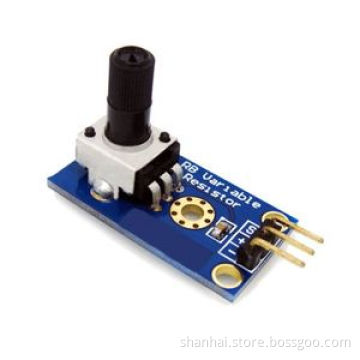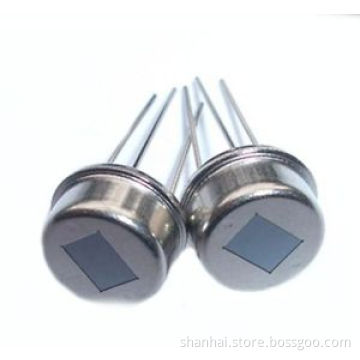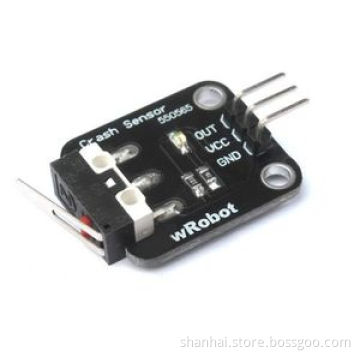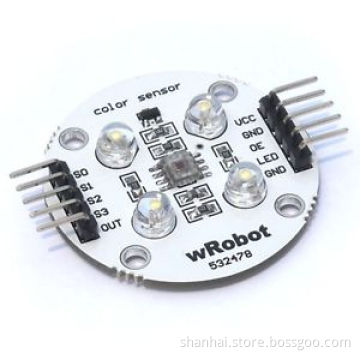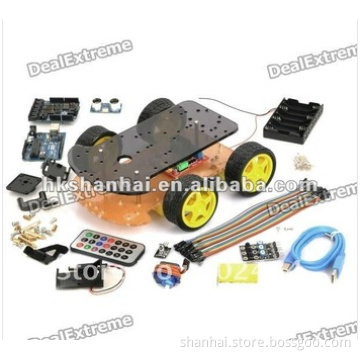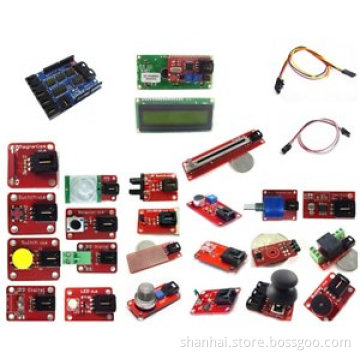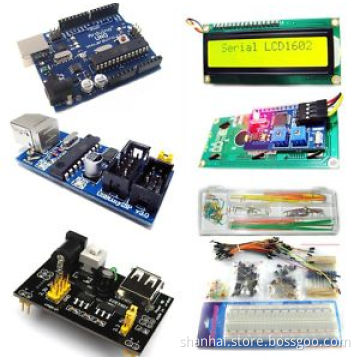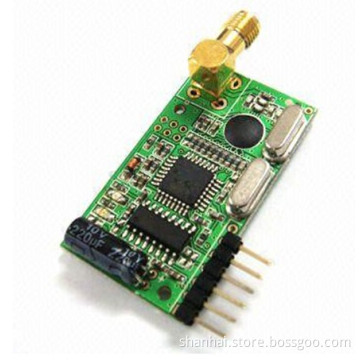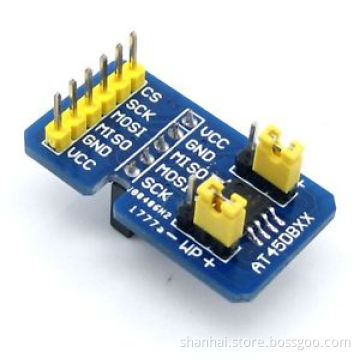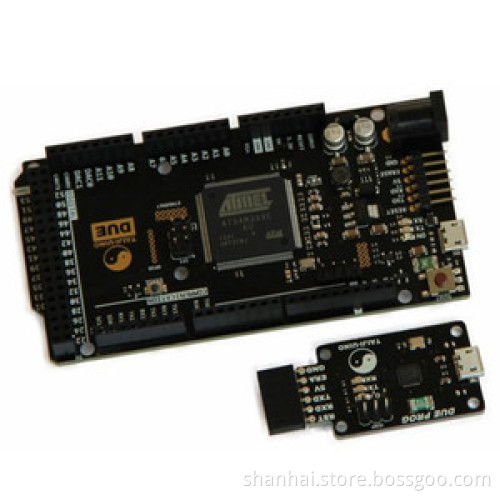
Arduino Uno Due PRO Module with Programmer Downloader Compatible with Arduino
- Payment Type:
- T/T, Paypal, Money Gram, Western Union
Quantity:
Your message must be between 20 to 2000 characters
Contact NowBasic Info
Basic Info
| Place of Origin: | China |
|---|---|
| Payment Type: | T/T, Paypal, Money Gram, Western Union |
Product Description
Product Description
Arduino uno Due PRO Module with Programmer Downloader Compatible with Arduino Due
Taijiuino Due PRO Module With Programmer Downloader
This item come with two modules:
The other one is Taijiuino Due Programmer Downloader
What is Taijiuino Due PRO Board?
Taijiuino Due PRO board derives from Arduino Due. It is completely compatible with Arduino Due. Users could program it with Arduino IDE.
Differnece from Arduino DUE:
1, Removed the ATmega16U2 chip, break out the pins for external downloader.
2, Break out all the unused pins of the chip ATSAM3X8E on Arduino DUE
3, Add ethernet interface of ATSAM3X8E on the board
4, Removed LED on Pin 13
5, Modified the PCB layout and the PCB is gold-plated
6, 5V Serial interface is available
DUE WIRELESS PROG (In Developing) and here is one picture of the beta board:
We also found that the Arduino DUE schematic contains ethernet pins which, however, are not found on Arduino DUE board. It might because of the limited space on the Arduino Due board. We break them out on Taijiuino PRO Board.
Why remove the LED to pin 13?
LED on Pin 13 might be helpful sometimes. We found that both PC30 and PA23 connected with LEDs. Users could use those 2 LEDs if neccessary. So we remove the LED on pin 13 to keep the board more simple.
Warning Notice:
Same with Arduino Due, this board runs at 3.3V. The maximum voltage that the I/O pins can tolerate is 3.3V. Providing higher voltages, like 5V to an I/O pin may damage the board.
Overview:
The Taijiuino Due PRO is a microcontroller board based on the Atmel SAM3X8E ARM Cortex-M3 CPU (datasheet). It has 54 digital input/output pins (of which 12 can be used as PWM outputs), 12 analog inputs, 4 UARTs (hardware serial ports), a 84 MHz clock, an USB OTG capable connection, 2 DAC (digital to analog), 2 TWI, a power jack, an SPI header, a JTAG header, a reset button and an erase button.
The board contains everything needed to support the microcontroller; Simply connect it to a computer with a micro-USB cable or power it with a AC-to-DC adapter or battery to get started. This board is compatible with all Arduino shields that work at 3.3V and are compliant with the 1.0 Arduino pinout.
2, CPU Clock at 84MHz.
3, 96 KBytes of SRAM.
4, 512 KBytes of Flash memory for code.
5, A DMA controller, that can relieve the CPU from doing memory intensive tasks.
Schematic, Reference Design & Pin Mapping
EAGLE files: TAIJIUINO-Due-PRO-Reference-design. Zip (Not ready yet)
Gerber files: TAIJIUINO-Due-PRO-gerber. Zip
Schematic: TAIJIUINO-Due-PRO-schematic. Pdf
Summary:
Microcontroller AT91SAM3X8E
Operating Voltage 3.3V
Input Voltage (recommended) 7-12V
Input Voltage (limits) 6-20V
Digital I/O Pins 54 (of which 12 provide PWM output)
Analog Input Pins 12
Analog Outputs Pins 2 (DAC)
Total DC Output Current on all I/O lines 130 mA
DC Current for 3.3V Pin 800 mA
DC Current for 5V Pin 800 mA
Flash Memory 512 KB all available for the user applications
SRAM 96 KB (two banks: 64KB and 32KB)
Clock Speed 84 MHz
Taijiuino Due PRO Module With Programmer Downloader
This item come with two modules:
The other one is Taijiuino Due Programmer Downloader
What is Taijiuino Due PRO Board?
Taijiuino Due PRO board derives from Arduino Due. It is completely compatible with Arduino Due. Users could program it with Arduino IDE.
Differnece from Arduino DUE:
1, Removed the ATmega16U2 chip, break out the pins for external downloader.
2, Break out all the unused pins of the chip ATSAM3X8E on Arduino DUE
3, Add ethernet interface of ATSAM3X8E on the board
4, Removed LED on Pin 13
5, Modified the PCB layout and the PCB is gold-plated
6, 5V Serial interface is available
DUE WIRELESS PROG (In Developing) and here is one picture of the beta board:
We also found that the Arduino DUE schematic contains ethernet pins which, however, are not found on Arduino DUE board. It might because of the limited space on the Arduino Due board. We break them out on Taijiuino PRO Board.
Why remove the LED to pin 13?
LED on Pin 13 might be helpful sometimes. We found that both PC30 and PA23 connected with LEDs. Users could use those 2 LEDs if neccessary. So we remove the LED on pin 13 to keep the board more simple.
Warning Notice:
Same with Arduino Due, this board runs at 3.3V. The maximum voltage that the I/O pins can tolerate is 3.3V. Providing higher voltages, like 5V to an I/O pin may damage the board.
Overview:
The Taijiuino Due PRO is a microcontroller board based on the Atmel SAM3X8E ARM Cortex-M3 CPU (datasheet). It has 54 digital input/output pins (of which 12 can be used as PWM outputs), 12 analog inputs, 4 UARTs (hardware serial ports), a 84 MHz clock, an USB OTG capable connection, 2 DAC (digital to analog), 2 TWI, a power jack, an SPI header, a JTAG header, a reset button and an erase button.
The board contains everything needed to support the microcontroller; Simply connect it to a computer with a micro-USB cable or power it with a AC-to-DC adapter or battery to get started. This board is compatible with all Arduino shields that work at 3.3V and are compliant with the 1.0 Arduino pinout.
2, CPU Clock at 84MHz.
3, 96 KBytes of SRAM.
4, 512 KBytes of Flash memory for code.
5, A DMA controller, that can relieve the CPU from doing memory intensive tasks.
Schematic, Reference Design & Pin Mapping
EAGLE files: TAIJIUINO-Due-PRO-Reference-design. Zip (Not ready yet)
Gerber files: TAIJIUINO-Due-PRO-gerber. Zip
Schematic: TAIJIUINO-Due-PRO-schematic. Pdf
Summary:
Microcontroller AT91SAM3X8E
Operating Voltage 3.3V
Input Voltage (recommended) 7-12V
Input Voltage (limits) 6-20V
Digital I/O Pins 54 (of which 12 provide PWM output)
Analog Input Pins 12
Analog Outputs Pins 2 (DAC)
Total DC Output Current on all I/O lines 130 mA
DC Current for 3.3V Pin 800 mA
DC Current for 5V Pin 800 mA
Flash Memory 512 KB all available for the user applications
SRAM 96 KB (two banks: 64KB and 32KB)
Clock Speed 84 MHz
Related Keywords
Related Keywords

